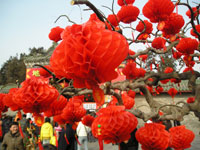| Dimsum’s simple guide to Chinese New Year – a 15-day celebration: |

|

|

|
| Culture | |
| Thursday, 25 February 2010 | |
|
To some it may come as a surprise that Chinese New Year is actually a 15-day celebration with different festivities going on each day. Obviously with a country as large as China, each region will have their own variations or even different customs, but generally Chinese New Year will start and end on the same day.
Here is a day-by-day guide of Chinese New Year:
Chinese New Year celebrations traditionally start on the eve of the New Year. In some parts of China, after the house has been cleaned from top to bottom – to rid the house of nasty spirits the family would sit down and make dumplings (jiaozi) together, a coin is hidden inside for one lucky person to find. The dumplings signify the reunion of the family as well as being a symbol of wealth and prosperity because these crescent shaped dumplings resemble ancient Chinese money, the dumplings are consumed around midnight so that there is money at the change of the new year. Sometimes a sweet sticky rice pudding called nian go is served – which helps people advance to higher positions in life. Because the word for fish (“Yu”) sounds like the word “abundance” fish is sometimes served at the end of a meal on Chinese New Year eve to wish for abundance. It is served whole – (head to tail) to signify a good beginning and end of the coming year, however generally in Chinese New Year cuisine you shouldn’t cut or sever anything as it is thought to cut good fortune this includes noodles. Again in some traditions carp is served on New Year’s Eve because it symbolises a profitable year ahead and you are not meant to consume the fish fully so that the family has an excess of good fortune.
On New Year’s day itself – the day where the gods of heaven and earth are welcomed, some families observe a traditional vegetarian meal to purify and counteract the previous night’s lavish meal. Some other reasons for a vegetarian meal include – to ensure good karma by refraining from eating anything that has been killed to the fact that it is the chicken’s birthday (something I was told as a child) and to ensure long and happy lives. “Jai” also known as Buddha’s delight is commonly served on this day – it includes ingredients like tofu – which represents blessings to the house, black moss – symbolising wealth, water chestnuts symbolising unity and fungus symbolising longevity.
The second day is sometimes known as the day of commencement and is when you can eat more lavishly. Typical dishes include chicken, shrimp, abalone, oysters (dried as well) and seaweed to inspire and raise profitability for the New Year. Some traditionally pray to Gods and ancestors on this day as well give their dogs extra special treatment as the second day is believed to be the dog’s birthday.
Some believe the third day is best spent avoiding other people as it is meant to be a day of disagreement, though to be quite honest I’ve not heard of this day!
Some families reserve this and the fourth day for visiting in-laws – as in some parts of China think that it is ‘Son’s in-laws’ day and again on the fourth day the kitchen god returns from heaven. Whatever you believe most agree that should continue to indulge in more symbolic dishes at home that include ingredients such as lettuce (because lettuce sounds like rising fortune) and seaweed.
On the fifth day most people stay in to welcome the God of wealth and refrain from visiting others as it brings bad luck to both parties.
The seventh day is regarded as everyone’s birthday and a day for making specific wishes. Certain foods are eaten – like noodles for longevity.
In the Fujian province they have another family reunion and pray to the God of Heaven at midnight. Between days 10 and 12 you should invite relatives over and visit friends. The 13th day should be a day of cleansing – when you eat simple foods such as congee to cleanse the day.
The 14th day should be spent preparing for the last day of Chinese New Year that is also known as the lantern day festival and the Chinese equivalent to Valentines day. Lanterns are hung everywhere and lantern parties are held, sweet-filled glutinous rice balls are eaten, they symbolise togetherness and completeness.
Whatever traditions you decide to follow or consume, we hope you have a prosperous new year!
|
|








